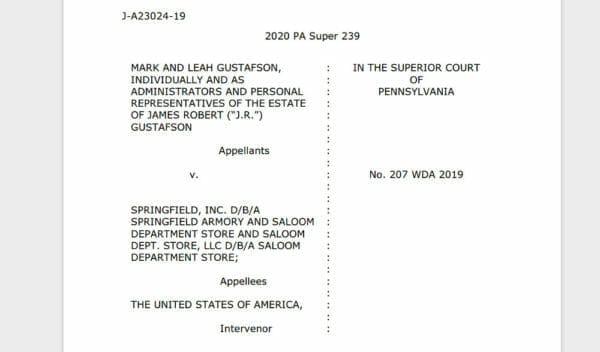
U.S.A. –-(AmmoLand.com)- On 20 March 2016, 32-year-old Joshua Hudec of Mount Pleasant, left his three children and house in the hands of an 18-year-old babysitter. The babysitter apparently left 13-year-old James Gustavson and 14-year-old John Bunsworth in the home. In the home was a Springfield XD pistol.
The babysitter is said to have asked Bunsworth to point the pistol at Gustavson in order to scare Gustavson into leaving. Bunsworth fired the pistol, killing Gustavson. He later claimed the magazine was removed from the pistol, so he thought it was unable to fire, and he did not mean to fire it. He was sentenced to involuntary manslaughter in juvenile court. Joshua Hudec was charged and pled guilty to five counts of child endangerment and reckless endangerment, to serve between 11.5 and 23 months in prison.
These details were not included in the case before the court.

In the court findings, only the fact the 14-year-old obtained the handgun in the Hudec household, then subsequently shot and killed Gustavson, is in the court document. It is accepted as fact that Bunsworth, the 14-year-old, told the truth when he claimed the magazine was out of the gun, and he assumed the gun was unloaded because the magazine had been removed.
The fact the pistol could fire with the magazine removed is the basis for the liability lawsuit.
On 28 September 2020, the Superior Court of Pennsylvania (one of two state courts of appeals in the state of Pennsylvania) issued an opinion which held the United States Protection of Lawful Commerce in Arms Act (PLCAA) was unconstitutional under the Tenth Amendment, the Commerce Clause, and the Fifth Amendment. The Court also held the Fourteenth Amendment and the Second Amendment could not render the PLCAA constitutional.
Because the United States government has intervened in the case, to protect the PLCAA, it is almost certain the case will be appealed to the Pennsylvania Supreme Court. From Gustafson v. Springfield, Inc. and United States of America, Intervenor:
The Gustafsons responded that the PLCAA does not apply here. In the alternative, they argued the Act is unconstitutional, because it (1) overrides Tenth Amendment principles of federalism,(2) cannot be sustained under the Commerce Clause,5 and (3) violates the Fifth Amendment. Upon learning of the Gustafsons’ constitutional attacks against its statute, the United States of America (“Federal Government”) intervened to defend the PLCAA. It claimed Congress properly enacted the PLCAA under the Commerce Clause and Bill of Rights.
With the probable appointment of Judge Amy Coney Barret to the Supreme Court, this case becomes interesting. The Tenth Amendment, federalism, and Commerce Clause claims are strong and well-argued. From the Pennsylvania decision:
We hold that merely because, at some point in time, that gun passed through interstate commerce,does not give Congress perpetual authority to regulate any harm it may cause.
(snip)
At that point, the activity surrounding the use or misuse of products reverts to a local matter, subject to state, not federal, regulation. This is especially true where, as here, the product kills someone who did not even purchase it.
The idea the gun killed someone is absurd, on its face. It would have been laughed out of any court before tort law escaped most regulation, starting in the 1970s. The gun did not point itself at a human being. The gun did not pull its own trigger.
The principle that the federal government has limited powers over state regulation is sound. The opinion states on page 43-44 that application of state law is in no sense an economic activity. The court cites the Supreme Court of the United States (SCOTUS) in the Lopez decision. But Lopez has been rendered mostly moot since it was written. Lopez was a sound decision, a start in limiting federal power under the Commerce Clause.
It is not so clear that state law allowing lawsuits against corporations in other states is not intruding into federal power to regulate interstate commerce. That state power would not have been accepted in 1960. In 1960, the ability to sue entities in other states was severely limited, as was the ability to sue corporations on frivolous notions of defective products which performed as intended.
A clarification based on what the states may do or not do in tort law, beyond their boundaries, might be in order. The power of the litigation lobby of trial lawyers is great. It would be difficult to overcome.
The opinion then claims the Second Amendment and the Fourteenth Amendment do not apply because gun manufacturers are not “people” for the purposes of the Bill of Rights. The opinion does not mention Citizens United, where SCOTUS held exactly the opposite.
Organized groups of people are still people, at least as far as the First Amendment is concerned. If they were not, the First Amendment would not apply to CNN, Fox News, or AmmoLand. Much the same logic applies to the Second Amendment.
Tenth Amendment challenges are exceedingly rare, as are state challenges to the Commerce Clause.
The optimum result for this lawsuit would be to make it to the Supreme Court; then have SCOTUS uphold the PLCAA via the Fourteenth Amendment and the Second Amendment, but fail to be upheld by the Tenth Amendment and the Commerce Clause.
An opinion that did so would reinforce federalism and the Bill of Rights. Optimistically, the privileges and immunities clause of the Fourteenth Amendment would be invoked.
Lopez was decided in 1995. Justice Thomas and Justice Breyer were on the court. Thomas was enthusiastically in favor of the decision, as were Justices Scalia and Kennedy, O’Conner, and Rehnquist. Justice Breyer dissented, as did Justices Ginsburg, Stevens, and Souter.
The court is decidedly more originalist and textualist now than it was in 1995. It is not inconceivable that Justices Thomas, Alito, Gorsuch, Kavanaugh, Barret, and possibly Roberts, would reach such an opinion.
It may be a good time to reinforce placing limits on the Commerce Clause while limiting state power to use torts to regulate firearms out of legal existence.
Realistically, the case is likely to be decided on only one of the Constitutional issues mentioned. It could easily be struck down by the Pennsylvania Supreme Court; appealed to SCOTUS, with SCOTUS refusing to grant a writ of certiorari, killing the appeal.
About Dean Weingarten:
Dean Weingarten has been a peace officer, a military officer, was on the University of Wisconsin Pistol Team for four years, and was first certified to teach firearms safety in 1973. He taught the Arizona concealed carry course for fifteen years until the goal of Constitutional Carry was attained. He has degrees in meteorology and mining engineering, and retired from the Department of Defense after a 30 year career in Army Research, Development, Testing, and Evaluation.


What we see in cases like this is a court majority starting with an ideologically predetermined end point and then cutting and pasting law to navigate a tortured path to that end point. The task of judges should be to apply legal principles to the particular case and let the appropriate logical tests lead them to the end point. Ideology blinds. Principles govern.
Although the 10th Amendment needs to be revived by the Supreme Court, this is not the case to do it with. There is a legitimate federal interest in banning lawsuits against manufacturers for the deeds done with firearms legally purchased. Otherwise, any state could use its liability laws and criminal codes to shut down any manufacturer in the country. Imagine if New Jersey could pass a law saying that there is automatic liability on the part of a manufacturer if a firearm is used in a crime? Who could stay in business?
I lived in WA state back in the day when the liars er um lawyers were pushing hard for ‘vicarious liability’ – in essence ‘someone’ else was always responsible for misuse or criminal abuse of a lawful product that resulted in injury/death to an innocent person. I don’t recall exactly how that played out but the ‘lesson’ was that there was no such thing as personal responsibility or accountability. I guess that is still the driving force behind lawyers and not coincidentally a certain political party as well, ties in quite well with big government taking care of people from… Read more »
What an excellent review…thank you my brother
There are a lot of stupid people in the world, manufacturers of anything potentially dangerous have been forced to consider this to continue in business. Unfortunately more people have been killed with unloaded guns because no amount of idiot proofing has ever been able to stop this. Untrained people with guns is a deadly combination, children more so. Trigger locks, gun safes etc. are accessories that go along with gun ownership. But how many people risk just hide them thinking they’ll never be found? Gun ownership is expensive, you end up paying a high price one way or another.
This wasn’t a case of a child playing around with the gun and “the gun accidently went off”. This was one irresponsible, stupid person directing a clueless gullible individual to do something absolutely insane. This wasn’t a case of the kid found the gun and played with it- a supposedly “responsible adult” told the kid to do something deadly and these 2 are the ones responsible for the results, not the gun owner. I keep my firearms secured even though I don’t have children. But not my defensive firearm- if my life or the life of my wife is being… Read more »
there is a far deeper problem with this than was mentioned above. Art 3 Sec 2 Par 1 has this case barred from being taken up by any lower court. Since there are parties in at least two different states, this is ONLY able to be taken up by SCOTUS on original jurisdiction. As to commerce clause issues, Filburn (about 1936 I think) SCOTUS declared that since Filburn’s wheat COULD HAVE moved interstate, or did not and someeone else’s wheat COULD have, FedGov now can butt ehri noses in, as they are wont to do. Sringfield’s pistol, once manufactured, did… Read more »
Some firearms WILL fire with the magazine removed- I own a couple of them. However- that fact is stamped on the firearm, in an obvious location (almost impossible to miss) and is printed boldly in the owner’s manual.
Seems the babysitter and the kid are the defectives and not the gun- first rule, they’re ALWAYS loaded and able to fire.
The parents should be held entirely to blame for not securing the firearm and ammunition and for not teaching their children not to play silly games with deadly instruments!
The 18 year old “adult” babysitter is also heavily at fault, for not immediately ending the gun play and for encouraging the little guy to do what he did. If I egged my nenghbour on to aim his old /38 Spl at his Wife and pull the trigger, I’d be an agent of her murder. What’s with the courts NOT holding here responsible for HER part? Blame the inert chunk of plastic and steel, not the brainless incompetents who used the tool so inappropriately. This thinking is precisely why we have 22 and 30 year old juveniles buring, lootin, g… Read more »
You’re right, the babysitter wasn’t negligent either. IMOA, The babysitter doesn’t have the money that Springfield might get milked for. BTW, the XD doesn’t have a mag disconnect feature either, it functioned as intended. “The babysitter is said to have asked Bunsworth to point the pistol at Gustavson in order to scare Gustavson into leaving”.